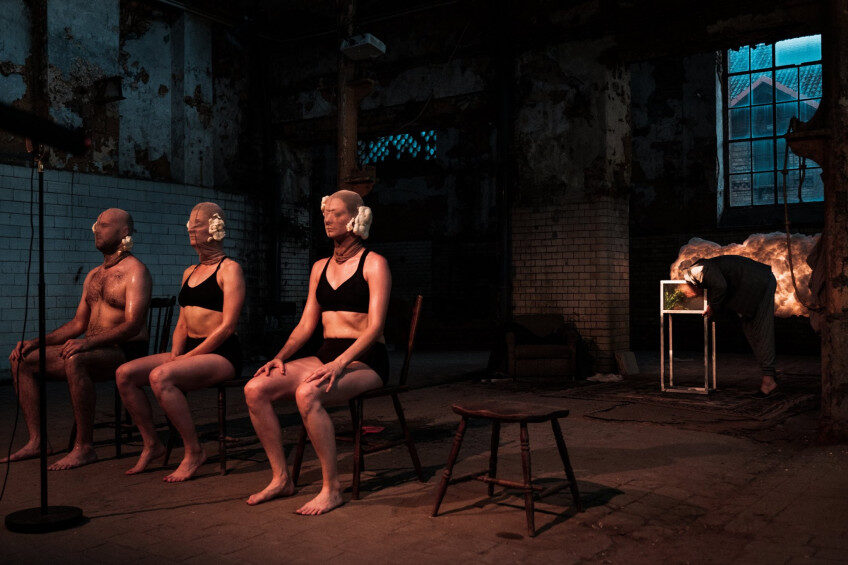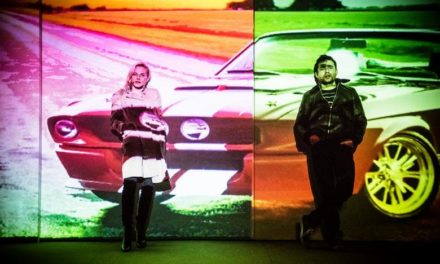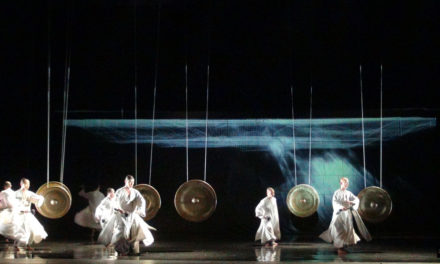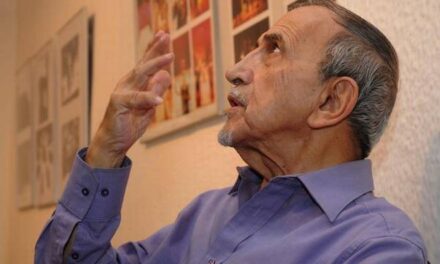For Part 1 go here.
Responding to The Crisis of The Individual: Therapy or Conjuring
“Let’s stay alert” – this was Marek Kościółek’s main message as he addressed his fellow theater workers to mark International Theater Day. Kościółek, leader of the Krzyk Theater in the village of Maszewo in north-west Poland,[31] went on to add: “Alertness is needed today more than ever before, and it should focus on those closest to us,”[32] – and there can be no doubt they are crisis. As Marta Mikuła from the Kana Theater[33] in the north-western city of Szczecin has observed, “We are in the midst of a crisis which is a great enigma.”[34] She has compared the pandemic to a certain kind of trauma: having survived it, we think we are returning to normal, but in fact, the way we live does not have much in common with normality. Mikuła again:
You think you’re already back to normal, but it’s only after a fair bit of time that you realize this isn’t really how you normally operate. Some things do reach you from beneath the surface, but you focus on staying active. And, on the one hand, this disrupts your usual rhythm and eats up a lot of your energy; on the other, this is a time when certain buried issues, certain weaknesses emerge, and their work begins.
Faced with this diagnosis, theater of ambulatory care offers just one remedy: as empathy and reserves of protectiveness are put to work, one needs to look at the mental wellbeing of an individual who is part of a community. According to members of the Kana community, “At the moment, our main task is to give ourselves time; and not just any sort of time: the kind of time where weakness is inherent.” The care provided to individuals in this “time of weakness” takes wildly divergent forms: from attempts to form a therapeutic relationship – which would enable individuals to work through the trauma of the pandemic – to creating a sphere of oblivion, which would provide respite from the ubiquitous fear around us, and offer a bit of perspective; whether through laughter, taking delight in form, or a radical change of subject. “My hunch is that we shouldn’t speak about what has happened,” says Helena Radzikowska from the Papahema Theater.[35] “People should be allowed to forget, rather than forced to return to those things, comment on them and mull them over,” adds Radzikowska, implying that what people need most these days is entertainment; and that theater is there “to distract them, lift the burden off their shoulders; quite simply, they need to be able to let their hair down as they come face to face with the actors.[36]
“Whatever happens, don’t think!” urges one of the actors appearing in PeKiN, a production Paphema put on as early as August, “Let’s have fun! Farmer, laborer, middle-class, whatever! Vodka is an egalitarian political system,”[37]– this is how the actors, graduates of the Puppetry Art Department of the National Academy of Dramatic Art in Białystok, encourage their audiences to have a good time. The ensemble’s chosen field is theater of the physical form, and they offer audiences a sort of highbrow entertainment: full of humor, and yet serious in its approach to the world around us. A production about the Palace of Culture and Science in Warsaw – which was bequeathed in the early 1950s by Joseph Stalin, and is now “a splinter in the heart of the city, the metropolis’ tight-lipped one […], a gift, a burden, and an entity”[38] – could not have been further from the realities of a capital city during a pandemic. Thus it offers a moment of respite as audiences party with top communist official Bolesław Bierut or take swimming lessons in the Palace’s famous pool – at the same time, it is an opportunity to give serious thought to both the resentment and nostalgia Polish people tend to feel when they think about communism and, indeed, the period of political transformation that followed.
“It’s very difficult to provide high-quality entertainment and take a stance on the ‘here and now,’” says Radzikowska: “It’s possibly the hardest thing there is.” Conjurers very deliberately distract their audiences from current issues, and entice people with their, perfectly mastered, conjuring: be it theater of the physical form, or improv, which is all the rage at the moment. In addition, conjurers are highly skilled practitioners of laughter therapy. As one tongue-in-cheek remark by Klancyk Theater put it, “The new reality we live in makes it very difficult to stay in control of time. Is it Monday today, Wednesday, or Saturday? We can’t really tell because we’re still wearing the same tracksuit bottoms.”[39] The pandemic is set to be a permanent feature of Klancyk’s online schedule, but it will be presented in a different form; as an anxiety-ridden topic domesticated by wearing a tracksuit, or by being able to nap with impunity while working from home. Another “benefit” of the pandemic (and the ensuing lockdown) is that it inspires a sense of gratitude towards home appliances. Klancyk bard Piotr Szczęsny Sikora composes hymns of praise to, for instance, the (usually) underrated Hoover. “We’re slowly re-emerging from our homes. But that’s no reason to forget the friends we have made during lockdown”[40]– this is Klancyk’s view of people’s freshly forged bonds with household appliances or pot plants. It was only in lockdown that their needs came to be acknowledged and taken into consideration. “You almost died, pretty plant,” intones Sikora, full of remorse, “I hadn’t been watering you like I should have.”[41]
The period of re-emerging from our homes and coming back to reality – still dominated by the coronavirus, and yet increasingly domesticated, more and more commonly known as “the new normal” – prompts social theaters, whose activities are focused less on entertainment and more on providing aid, to ask themselves key questions about the future forms of their work with local communities. “Do we help people get used to the situation, or do we perhaps create some sort of detachment, and tell them about the dangers [the pandemic brings]?” – this is the dilemma the Kana Theater had to face when they put together the program of their annual Spoiwa Kultury (Bonds of Culture) festival. Usually held during the summer holidays, this time it was postponed until late autumn. In 2020 festival explored the boundaries of human fear, which in recent months have been drawn and redrawn in a rather chaotic manner. Some people found the changing restrictions and different forms of isolation reasonable, while others saw them as ill-considered. Marta Mikuła observes that “when it comes to fear, people have set their boundaries in different places; meanwhile, the reality is that we need to work together.” She goes on to wonder: “how does one find a place where one can give oneself, and others, permission to talk about this fear at all?,” if reality is unlikely to provide us with such a place, given the widespread expectation that people should “bounce back?” This is the reason why, in all its activities, Kana seeks to “explore the issues of presence and absence, proximity and distance”; and use instruments peculiar to theater to establish safe – and, most importantly, shared – spaces where one can talk about one’s fear, and thus lay it bare and curb its power – all the greater when fear is experienced in isolation. The Kana Theater team got to know the power of fear during lockdown, when they convened online workshops with young audiences. The result of these sessions was an – undoubtedly therapeutic – “tale of isolation and the pandemic.” According to the authors of the piece, it was made up of:
several stories, very much alike, told through the prism of individual solitudes. Each person was going through something similar, but felt completely isolated in their feelings […]. The discrete solitudes came together to form a communal statement.
The Węgajty Theater took a similar view of the crisis of the individual during the pandemic: it is a feeling of loneliness which can be alleviated by upholding a sense of community during lockdown. These days, the idea of a “theater that people need” is one of the cornerstones of the work Węgajty does. Their activities involving residents of a care home in nearby Jonkowo are just one example of how this idea is put into practice. “Our first Skype rehearsal! Went swimmingly!”[42] is how Wacław Sobaszek kept his followers up to date on social media, even though elderly actors Irena Anacka and Jan Jendrycki had had no previous experience of the online platform. Likewise, the Sobaszeks had never used it before to conduct a rehearsal. While direct contact remains the essence of their work in theater, they put their reservations about any form of mediation to one side, as they sought to support, in every possible way, their nearest and dearest, whose advanced age made them particularly vulnerable to coronavirus, and thus doubly isolated in the pandemic. A “theater people need” was needed more than ever before.
As it turned out, just a few days previously, the Węgajty Theater was needed for a different sort of thing altogether: like every year (though this time in much smaller numbers), they visited nearby homes, observing an old local custom known as wołoczebne or Alilujka (Hallelujah)[43]. The barking of village dogs merged with traditional songs and the drawn-out sound of the ligawa (a horn-like instrument best-known in northern and eastern Poland and which is more than a meter tall and points towards the sky), all heralded the approach of Easter “carol singers.” Before the sound of the accordion and fiddle joined the song, and a barking dog, the hosts, who had been looking forward to the musicians’ visit all day, came up to the gate to offer their visitors hard-boiled eggs (Poland’s traditional Easter breakfast begins with family and friends sharing pieces of boiled egg as they exchange wishes); “they were grateful for the genuine solidarity, and the simple human warmth, shown by the visiting theater.”[44] Still, the visits were socially distanced, in keeping with the restrictions in place during the pandemic.
One preliminary insight offered by theater of ambulatory care is that social distancing is the greatest threat to an individual’s mental wellbeing, an emblem of sophisticated callousness in social relations. According to members of the Kana group,
The malicious thing about this pandemic is that people respond to other crises – social or political – by coming together. Whatever we do, we are in it together, building a community, reinforcing our floodbanks with sandbags. Working together is our remedy. But at the moment, coming close to someone is a potential risk. This makes people extremely wary of the world around them, and of other people.
As academic and civic rights campaigner Inga Iwasiów has stressed, in their “sanitized” guise people become “biological beings, only intent on protecting themselves and their families – to the extent that any person outside this circle will be a threat, and we’ll give up [interacting with other people].”[45] If we do not want this version of humanity to prevail, social theaters are needed as the necessary “link”[46] on our way back to the “new normal”: a link which ensures that bonds do not suffer as we look after our health.
Staying connected is vital for small, local communities, whose access to the arts is often severely limited. Marek Kościółek argues that
if there is grassroots activity in a community; if there is space for people to come together to forge real bonds – the community has some real leverage. Theater, and the arts in general, are instrumental in making this happen.
This is why, in the (post)pandemic thaw, Kościółek’s Krzyk Theater “begins with things that can bring people together.” One of these is Skrzydładla Mam (Letting Mums Fly), a series of workshops for stay-at-home mothers from the Maszewo region, held over the summer and combining theater, psychology and education. The idea came about as a response to a need that was there even before the pandemic: providing adults with the skills they need to get a better grasp of the world their children live in. This need became even more urgent in a crisis triggered by lockdown. Family problems and rifts in relationships were laid bare; seemingly minor insults and conflicts were exacerbated; salt was rubbed into wounds – and all this calls for theater that can treat the wounded family-cum-community. What is needed is a link between children and adults; after all, this may not be the only time when they are compelled to stay at home together. Theater of ambulatory care strives, therefore, to undo this element of coercion and transform being together across generations into a joyous and urgent act of will.
Human relationships are the essence, and main theme, of the work of the Naumiony Theater,[47] based in Ormontowice in Upper Silesia, western Poland. The vast majority of the Naumiony ensemble were particularly vulnerable to coronavirus because of their advanced age. The theater thus had to act immediately, and find a way to reconcile their refusal to isolate the oldest members of their group and the need to overcome the very real threat of falling ill, or succumbing to loneliness. In keeping with government regulations, the ensemble deployed a variety of means, theatrical and otherwise, to ensure everyone in their multigenerational “extended family” was safe and well – physically and mentally – and had food supplies.
The Węgajty Theater Easter Food Donation Appeal, mentioned in the introduction, was a similar sort of event: an instance of responding immediately to a crisis as and when it is diagnosed. The appeal was a gesture towards those most in need – homeless people from an Olsztyn hostel. At the same time, it was a way of energizing the local community and getting them involved: the people of Jon kowo are “the loveliest neighbors Węgajty Theater could wish for,” and Wacław Sobaszek took to his personal Facebook page to thank them “for an abundance of excellent natural food, free of chemicals and obtrusive plastic and packaging.” As Rebecca Solnit has observed, “Sometimes it’s wise to move rapidly from danger; sometimes it’s altruistic to gather supplies to share.”[48] Apart from being an illustration of Solnit’s words, the appeal launched by the Sobaszeks has yet another dimension to it: it is an art performance and a creative manifesto. Husband and wife set out on their “Easter carol singing” journey north in a minibus plastered with the words “Food Appeal.” In addition, as Marek Kurkiewicz, a friend of the Węgajty Theater (and himself a member of an alternative ensemble, the 3.5 [49]) has observed, the journey made people more aware of the plight of creatives who had lost all their income during the pandemic – “and suddenly what they need isn’t attention, but food. Quite simply, they need it to survive.”[50] This is what happened to the members of the 3.5.[51]
Theaters working with prisoners had utterly different challenges to face, and different needs to respond to. Obviously, inmates were isolated even before the pandemic: however, Covid exacerbated their loneliness, as a blanket ban on visits was introduced on 19 March 2020. “Prisons and theaters were the first to close, and they will probably be the last to open, certainly in their usual form,”[52] says Agnieszka Bresler, founder of the Kobietostan (Womenstan, a pun on the suffix “-stan,” meaning “land”) Collective [53]. Like the Jubilo Foundation,[54] the Kobietostan Collective was completely cut off from its ensemble without any warning and, although it had the funds it needed, work in its usual form had to be suspended. Looking for new means of communication proved to be the greatest challenge: widely available online platforms, which would have been the most obvious solution, were out of the question in a prison setting. Jubilo coped by exchanging actual letters with inmates. As for Kobietostan, after a long struggle, two project co-ordinators finally received permission to enter the prison. As Bresler has put it, “the pandemic has shown us what the crux of our project was, what needed saving – and that was relationships.” Paradoxically, the creatives’ redoubled and manifest efforts to save their relationship with inmates made that relationship even stronger. A sense of separation, now shared by both sides of the relationship for the first time (as one group was locked away behind bars and the other at home), became their communal experience. Bresler says:
The guys would often call me from inside. They said jokingly that now we knew what it was like for them, every day; now we’re the ones who aren’t allowed out of the house, and we’re being told what we are and aren’t allowed to do.
The therapeutic approach and conjuring are two different cures for individual problems; distinct ways of coping with the difficult emotions which have made the pandemic and lockdown such a major challenge. With both options, the bond between a creative and their community turns out to be the healing formula. As the renowned psychiatrist and existential therapist Irvin D. Yalom has put it, “it’s the relationship that heals.”[55] Theaters of ambulatory care specializing in either therapy or conjuring are keenly aware of this. As they foster close and caring relationships, they press on with their para-theatrical work, notwithstanding the restrictions brought about by the pandemic.
For Part 3 go here.
FOOTNOTES
31. The Krzyk Theater was founded in 2002 in Maszewo by Marek Kościółek. Krzyk productions are manifestos; they stand up for people and ideas. Its stage work aside, Krzyk is also a theater society, collaborating with the people of Maszewo on a number of projects, which are both about art and things that matter to the community. See https://www.facebook.com/teatrkrzyk.
32. Teatr Krzyk (@teatrkrzyk), “Zachowajmy czujność,” Facebook, March 27, 2020, https://www. facebook.com/teatrkrzyk/posts/2811053935616372.
33. Dariusz Mikuła, Marta Mikuła and Paula Rudź, interview by Katarzyna Kułakowska, Warsaw– Szczecin, July 15, 2020.
34. Kana is an alternative Theater and Arts Centre, founded in Szczecin in 1978. After the death of founder Zygmunt Duczyński in 2006, the ensemble have continued both their theater work (putting on highly original productions and organizing theater festivals, at home as well as abroad) and work in the arts in the broadest sense of the term (supporting independent creatives in Poland’s alternative scene). See http://kana.art.pl.
35. The Papahema Theater was founded in 2014 by four students in their final year at the Puppetry Art Department of the National Academy of Dramatic Art: Paulina Moś, Helena Radzikowska, Paweł Rutkowski and Mateusz Trzmiel. Paphema looks at literary classics through the lens of contemporary sensibility, and combines the means used by actor-based theater with the inexhaustible language of the theater of the physical form; and marries humor and ironic detachment with serious thoughts on the world we live in. See https://teatrpaphema.pl.
36. Helena Radzikowska, interview by Katarzyna Kułakowska, Warsaw, July 15, 2020.
37. A quote from a production of PeKiN by Agata Biziuk, directed by Agata Biziuk, Jewish Theater in Warsaw, November 28, 2019.
38. Biziuk, PeKiN.
39. Klancyk (@Klaaancyk), “Nasza nowa rzeczywistość…,” Facebook, April 9, 2020, https://www. facebook.com/Klaaancyk/posts/10163444424510207.
40. Klancyk (@Klaaancyk), “Powoli wynurzamy się z domów,” Facebook, May 10, 2020, https://www.facebook.com/Klaaancyk/posts/10163655385445207.
41. Klancyk (@Klaaancyk), “Dziś Piosenka Piotra,” Facebook, May 17, 2020, https://www. facebook.com/watch/?v=247179163184697.
42. Teatr Węgajty (@teatr.projektterenowy), “Pierwsza próba nowego spektaklu,” Facebook, March 17, 2020, https://www.facebook.com/teatr.projektterenowy/posts/2532317420343937.
43. The Alilujka peregrination (also known as “the wołoczebne peregrination”) is a vanishing tradition of “Easter carol singing,” practiced in northern and eastern Poland. In keeping with the custom, the “carol singers” visit nearby homes on Easter Monday; in return, the hosts offer them a snack, usually some of Poland’s Easter staples, such as hard-boiled eggs or sausage. The singers and local people all sit down to a communal feast the following day. The Węgajty Theater has been upholding this tradition since 1990, walking from door to door in the village of Dziadówek on the northeastern outskirts of Poland. Apart from “Easter carol singing,” Dziadówek also maintains the tradition of an Easter dance, hosted by one of the residents, and open to all their neighbors.
44. Marek Kurkiewicz, “Zbiórka żywności, czyli kiedy teatr potrzebny jest potrzebny,” Gazeta Świętojańska, May 20, 2020, http://gazetaswietojanska.org/kultura/pomorze-kultura/zbiorka-zywnosci czyli-kiedy-teatr-potrzebny-jest-potrzebny/.
45. Inga Iwasiów, “Czerwone szpilki nie znikną,” interview by Violetta Szostak, Wysokie Obcasy, no. 32 (August 8, 2020): 19.
46. Marek Kościółek, interview by Katarzyna Kułakowska, Warsaw – Maszewo, July 22, 2020.
47. The Naumiony Theater in Ormontowice is an amateur theater established in 2004. Its productions are inspired Upper Silesia’s history and traditions.
48. Solnit, “The Impossible Has Already Happened.”
49. The 3.5 Theater was founded in 2012 under the auspices of the Sztum Arts Center in northern Poland. The following year, it moved to the nearby town of Dzierzgoń, where it still works with the local community. The 3.5 is socially engaged, “a theater of things which matter to people.” See https://teatr3i5.pl. 50 Kurkiewicz, “Zbiórka żywności.”
51. See Marek Kurkiewicz, “Życie codzienne w czasie zarazy: Teatr 3.5,” interview by Piotr Wyszomirski, Gazeta Świętojańska, March 23, 2020, https://gazetaswietojanska.org/polecane/zycie codzienne-w-czasach-zarazy-teatr-3-5/.
52. Agnieszka Bresler, interview by Katarzyna Kułakowska, Warsaw–Wrocław, July 9, 2020.
53. The Kobietostan Collective is a group of female creatives and social activists, whose work is all about women and for their benefit. Behind Kobietostan lay a refusal to accept the fact that women from disadvantaged backgrounds are pushed to the margins and denied a voice. Founded by Agnieszka Bresler, the collective stands for equal rights, and the empowerment of women who are left out of mainstream society. See https://www.facebook.com/kobietostan.
54. The Jubilo, an international group comprising actors and musicians, was founded in Wrocław in 2011 by Daniel Han and Diego Pileggi. The Jubilo Foundation was established in 2013 and, the following year, began working with inmates from a prison in Wrocław. The collaboration, which has continued till now, was Jubilo’s response to prisoners being excluded and consigned to the margins of society. See http://jubiloproject.com/en/.
55. Irvin D. Yalom, Love’s Executioner and Other Tales of Psychotherapy (New York: Perseus Books, 2012), 112.
This article was translated by Joanna Błachnio and first published by Pamiętnik Teatralny 2020/4. For the original article go here.
This post was written by the author in their personal capacity.The opinions expressed in this article are the author’s own and do not reflect the view of The Theatre Times, their staff or collaborators.
This post was written by Katarzyna Kułakowska, Katarzyna Kalinowska, Olga Drygas, Michał Bargielski.
The views expressed here belong to the author and do not necessarily reflect our views and opinions.


















